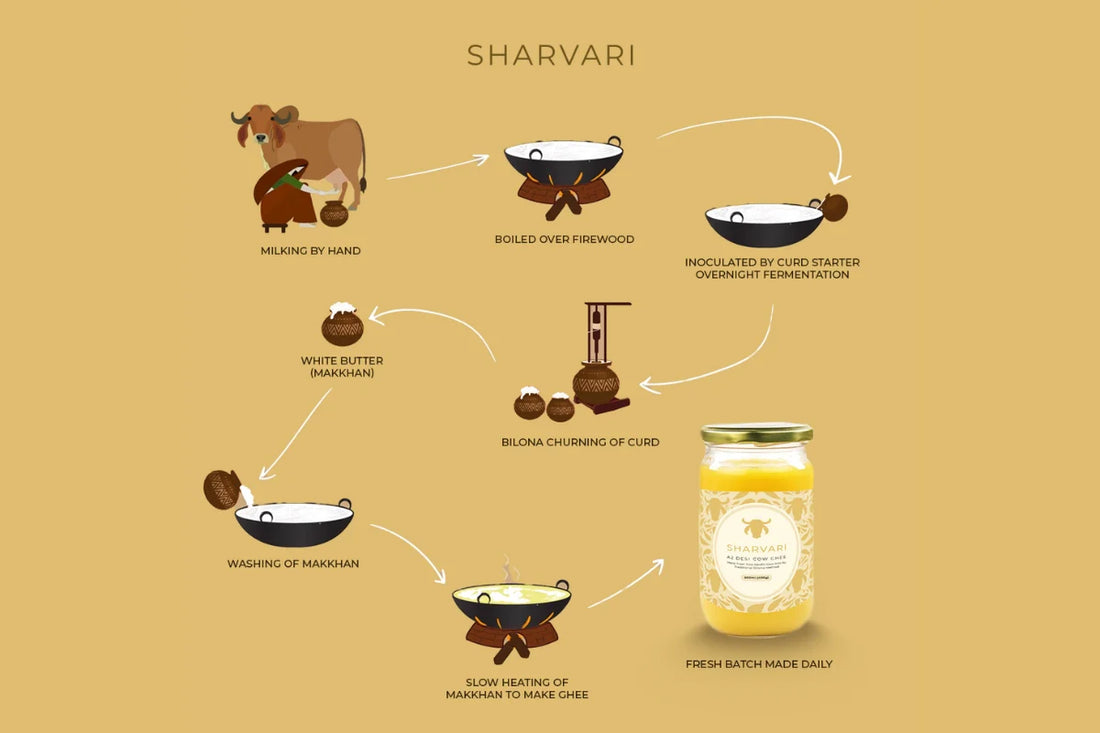What is Bilona Ghee?
Sankalp Java
What is this Bilona Ghee that has been trending among young influencers, fitness enthusiasts, Ayurvedic doctors, and so on? I hope to clarify this today. By the end of this post you’ll be equipped to know if bilona ghee commands a premium and whether it’s worth adding to your wellness routine.
Ghee is milk fat that is derived through the process of heating makhan to remove excess water and other milk solids.
Cream vs Curd: How Ghee is Made
There are primarily two ways through which ghee is made:
1) From cream – Here, after boiling milk, the cream that settles on top is collected and then heated, which yields ghee
2) From curd – Milk is converted to curd, which is then churned to yield butter; the butter is then finally heated to obtain ghee.
Both methods yield milk fat by removing water and other milk solids. So, why does the process matter? In fact, when ghee is made from cream, it seems more efficient, as there isn’t much wastage. We utilize the milk with less fat as toned milk and also make ghee from the extra cream. This efficiency argument makes logical sense, but my personal experience with traditional practices has taught me that sometimes the “less efficient” path offers hidden benefits.
My Grandfather’s Curd at night tip
I have had a positive experience by incorporating certain principles of ayurveda into my life, which has led to a great improvement in my quality of life. For example, my grandfather has always recommended that I not consume curd at night, as it leads to having aggravated sinuses the next morning, something I have experienced.
The Power of Small Lifestyle Change
This knowledge, passed down in each family, is something that we don’t pay enough attention to in our modern lives, but it does make a world of a difference in the quality of life we lead. I no longer have headaches when I wake up in the morning, and my sinuses are so much better. This information, which we may consider trivial, is also advocated in ayurveda. Yes, there is no direct evidence in science, and individual experience may vary; traditional wisdom sometimes precedes scientific validation, and I have observed that my body feels better when I limit curd consumption at night. Seeing these simple changes transform my mornings convinced me of Ayurveda’s practical value.
What I am trying to convey here is that the principles in Ayurveda were discovered several centuries ago and are applicable in many cases even today. This is something to pay attention to, as small changes in our lifestyle can lead to significant improvements in quality of life. I am not promoting Ayurveda as the gospel that should be followed to the letter, but as something that can help improve your quality of life with small changes.
Preliminary Research on Bilona Ghee
Now, when Ayurveda recommends ghee, it is generally suggested that it be made by the bilona method, as this was the method prevalent and recommended in Ayurvedic texts dating back several centuries, even millennia, this is seen in the Charakh Samhita as well. Emerging scientific research supports several advantages of traditional bilona ghee preparation. It also indicated that traditional fermentation preserves more antioxidants and creates a superior omega-3 to omega-6 fatty ratio[1][2].
So what does this mean for us today?
Reasons to make the switch
My experience, supported by Ayurvedic doctors, suggests that bilona ghee is the better choice than ghee made from cream, not just because of the higher bioavailability of nutrients, being lighter to digest, but also because of the wisdom passed down by our ancestors. Yes, we live in completely different times with different solutions, yet I believe from my own personal view, bilona ghee to be considered superior.
Lastly, even if none of this Ayurvedic context were applicable in today's age, the studies that suggest bilona ghee to have higher bioavailability of nutrients, higher omega-3s, should make a strong case for considering ghee made by bilona method over regular ghee made from cream.
I’m sure your elders may also have such remedies or tips like my granddad’s. If you have any such stories or home remedies, please share them in the comments below.
[1] https://pmc.ncbi.nlm.nih.gov/articles/PMC4061595/
[2] https://pmc.ncbi.nlm.nih.gov/articles/PMC9813307/
